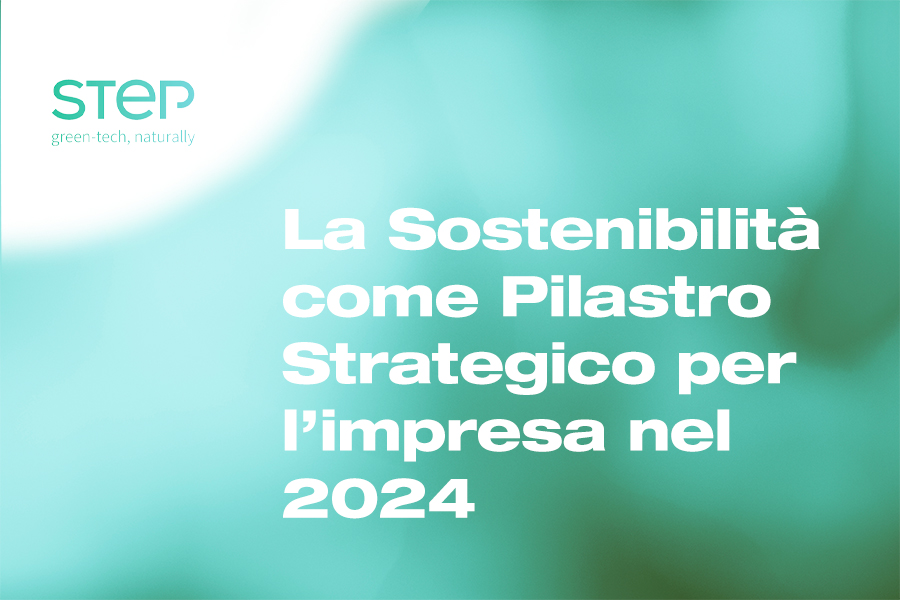
- Insight
- March 15, 2024
Sustainability as a Strategic Pillar for Business in 2024
In a world that is increasingly aware of the importance of environmental and social impact, the concept of sustainability has evolved considerably in the area of Corporate Sustainability: indeed, sustainability is now a strategic pillar for businesses. From 2020 to the present, companies have begun to realize that sustainability is not limited to practices such as installing solar panels or cogeneration, but requires a well-planned strategy that embraces all aspects of Environmental, Social and Governance (ESG). It is no longer a choice, but an increasingly necessary condition for doing business.
In this article we will focus on 5 key points for setting up a long-term sustainability strategy.
Data and Transparency: the foundation of Corporate Sustainability in strategy
A key step in this direction has been the adoption of new reporting requirements imposed by the European Union, such as the Corporate Sustainability Reporting Directive (CSRD). This has led companies to report previously randomly provided data in a transparent and structured manner. One example is materiality analysis, which ensures that ESG data are consistent and reliable, elevating them to the same level as financial data. Our advice is to understand from the very beginning of one’s journey what data will be needed and consequently, how to retrieve, analyze, monitor and communicate it.
Quality of Data is a Determining Factor in 2024
The quality of the data is a crucial and determining factor. A well-structured data governance system, including:
- A clear definition of responsibilities;
- Data quality training;
- A control platform.
Errors in data can in fact lead to wrong investments, especially in technology, emphasizing the importance of having a structured method and approach in their collection.
Sustainability means competitiveness
Companies are beginning to understand the real value of sustainability. It not only enhances corporate reputation but also contributes significantly to its overall value. First, sustainability is an increasingly important factor for human resources and every stakeholder, internal and external: sustainable companies are more attractive to both talent and consumers; concern about climate change is now a key factor in purchasing decisions (Deloitte, 2022). Finally, green Italy’s latest report on the state of the green economy shows that companies that have invested in sustainability have averaged 10 percent higher sales than their competitors over the past year.
A paradigm shift in production systems is required of us by the planet, by the resources available to us. If that were not enough, the same change is demanded of us by the market and increasingly mandated by national and European regulations.
Planning for Change STEP by STEP.
It is essential to have a long-term vision. Value creation may require gradual steps, such as reinvesting savings from energy efficiency into more radical solutions in the supply chain, thereby increasing the competitiveness of one’s business over time and consolidating it. The focus of the company must shift to the path, to achieving intermediate goals. Immediate results often have a marginal impact on sustainability (both in terms of reduced environmental impact and return on investment).
Importance of Governance in Strategy
A crucial aspect in this paradigm shift is the need to raise awareness of the importance of sustainability among all business operators. Governance plays a key role in this process, as companies often need to step outside their comfort zone to meet sustainability KPIs. To succeed requires open-mindedness and ad hoc training, with a long-term strategy that involves key stakeholders and considers corporate reorganization or adaptation.
What to Avoid: Unrealistic Goals and “Improvised” Strategy.
Finally, it is crucial to avoid setting unrealistic goals and acting without a clear strategy. It is highly counterproductive to invest without analysis and foresight: planning must start with the understanding that sustainability brings competitive advantage and that the initial cost can be transformed into long-term value.
In conclusion, 2024 marks a turning point in companies’ approach to sustainability. No longer seen as a burden but as a strategic opportunity to create value, increase market competitiveness and improve one’s image.
Do you want to embark on a path to decarbonization?
Write us a message! STEP focuses on developing highly innovative decarbonization projects for Italian industry

